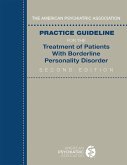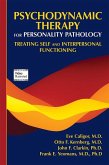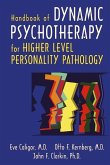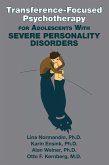Determining the amenability of personality disorders to psychotherapy -- a patient's capacity to benefit from verbal approaches to treatment -- is important in helping clinicians determine the treatability of cases. Michael Stone here shares the factors he has observed over long years of practice that can help practitioners evaluate patients, stressing the amenability of the various disorders to amelioration. By focusing on which patients are likely to respond well to therapeutic intervention and which will prove most resistive, his book will help therapists determine with what kinds of patients they will most likely succeed and with which ones failure is almost a certainty.
Stone establishes the attributes that affect this amenability -- such as the capacity for self-reflection, motivation, and life circumstances -- as guidelines for evaluating patients, then describes borderline and other personality-disordered patients with varying levels of amenability, from high to low. This coverage progresses from patients belonging to the DSM "anxious cluster," along with the depressive-masochistic character and the hysteric character, to patients who demonstrate an intermediate level of amenability to psychotherapy. He introduces the interrelationship between borderline personality disorder and dissociative disorders and discusses treatability among certain patients in Clusters "A" and "C," as well as others with narcissistic, histrionic, depressive disorders. Final chapters address the most severe aberrations of personality and the limitations they impose on the efficacy of therapy. Personality-Disordered Patients is filled with practical, clinically focused information. This guideline structured book: ¿ Covers all personality disorders-including ones not addressed in the latest DSM such as sadistic, depressive, hypomanic, and irritable-explosive¿ Identifies both attributes necessary for treatability and factors associated with low treatability¿ Pays particular attention to borderline disorders, which represent the most discussed conditions and are among the most challenging to psychotherapists¿ Reviews personality traits whose presence, if intense-even if unaccompanied by a definable personality disorder-creates severe problems for psychotherapy
Numerous case studies throughout the book provide examples that will help therapists determine which of their own patients are most likely to benefit from their efforts and thereby establish their own limits of effectiveness. By alerting practitioners to when therapy is likely to fail, these guidelines can help them avoid the professional disappointment of being unable to reach the most intractable patients.
Stone establishes the attributes that affect this amenability -- such as the capacity for self-reflection, motivation, and life circumstances -- as guidelines for evaluating patients, then describes borderline and other personality-disordered patients with varying levels of amenability, from high to low. This coverage progresses from patients belonging to the DSM "anxious cluster," along with the depressive-masochistic character and the hysteric character, to patients who demonstrate an intermediate level of amenability to psychotherapy. He introduces the interrelationship between borderline personality disorder and dissociative disorders and discusses treatability among certain patients in Clusters "A" and "C," as well as others with narcissistic, histrionic, depressive disorders. Final chapters address the most severe aberrations of personality and the limitations they impose on the efficacy of therapy. Personality-Disordered Patients is filled with practical, clinically focused information. This guideline structured book: ¿ Covers all personality disorders-including ones not addressed in the latest DSM such as sadistic, depressive, hypomanic, and irritable-explosive¿ Identifies both attributes necessary for treatability and factors associated with low treatability¿ Pays particular attention to borderline disorders, which represent the most discussed conditions and are among the most challenging to psychotherapists¿ Reviews personality traits whose presence, if intense-even if unaccompanied by a definable personality disorder-creates severe problems for psychotherapy
Numerous case studies throughout the book provide examples that will help therapists determine which of their own patients are most likely to benefit from their efforts and thereby establish their own limits of effectiveness. By alerting practitioners to when therapy is likely to fail, these guidelines can help them avoid the professional disappointment of being unable to reach the most intractable patients.
Dieser Download kann aus rechtlichen Gründen nur mit Rechnungsadresse in A, D ausgeliefert werden.









